Coalition Government Huge NHS No Spending Cuts Blunder Continues to Bankrupt Britain
Politics / NHS Oct 24, 2010 - 02:20 PM GMTBy: Nadeem_Walayat
 The coalition government announcement of spending cuts was crippled from the outset as a consequence of ring fencing the biggest spending departments whilst the mainstream media obsessed over 30% cuts to far smaller departments, the consequences of which are that total UK government spending will NOT fall for ANY year.
The coalition government announcement of spending cuts was crippled from the outset as a consequence of ring fencing the biggest spending departments whilst the mainstream media obsessed over 30% cuts to far smaller departments, the consequences of which are that total UK government spending will NOT fall for ANY year.
The below graph translates the announced phased in spending cuts per budget head indexed for inflation of 3% per year into 2014-15.
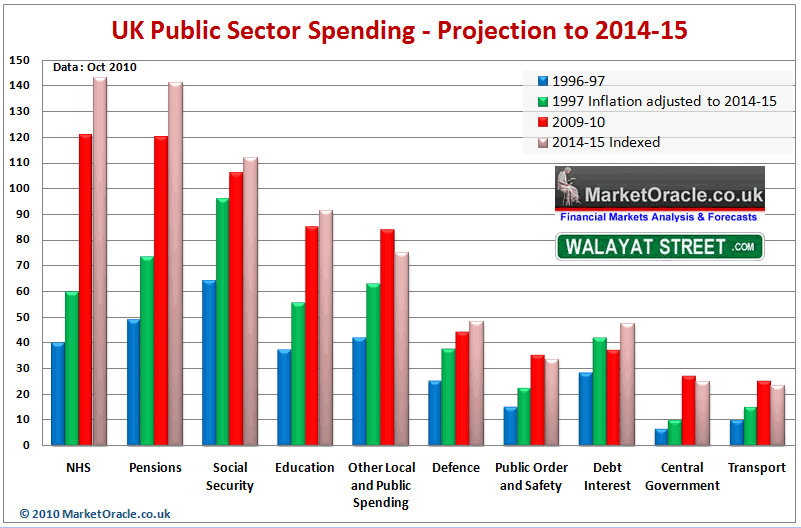
The graph clearly shows that the largest spending departments will see NO cuts in spending, where the NHS as the largest department will actually grow the most over the next 4 years as it has been ring fenced for real terms growth. The NHS annual budget will rise from £120 billion for 2009-10 to at least £143 billion by 2014-15, or £50 billion of extra spending on the NHS over the next 4 years. The consequences of this is that government spending will continue to increase every year from £680 billion for 2009-10 to at least £739 billion for 2014-15.
Therefore the only real mechanism for effecting cuts in non ring fenced spending departments will continue to be by means of Inflation as warned of in the Inflation Mega-Trend ebook (FREE DOWNLOAD) and more recently (29 Jun 2010 - UK ConLib Government to Use INFLATION Stealth Tax to Erode Value of Public Debt ). However the lack of cuts in the biggest spending departments also means that total debt burden in real terms as a percentage of GDP will not shrink as the public is being led to believe but actually continue to grow and at best suggests stabilisation at 72% of GDP by 2015-16, which is against government expectations for public debt to fall to 65% of GDP.
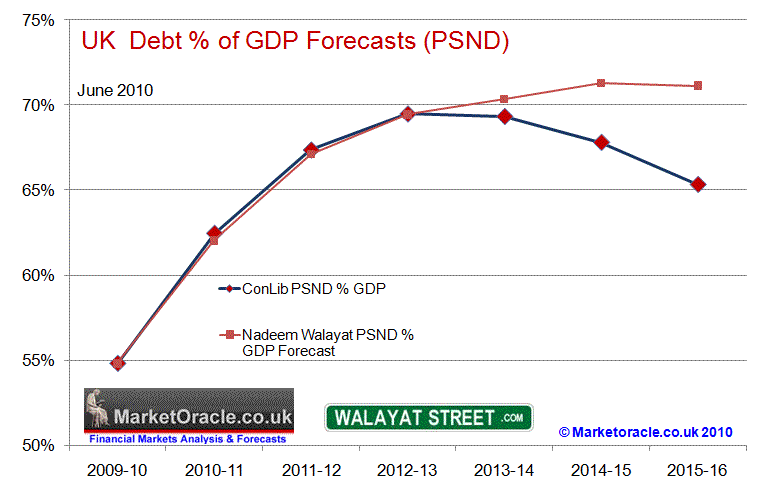
Therefore contrary to coalition government statements, the growing real terms debt burden means that Britain is still on the path towards Bankruptcy because the coalition government does NOT have the courage to take on huge sacred spending cows such as the NHS, which it may yet be forced to do as consequence of market forces at a later date.
Labour Out of Control Spending on the NHS
The NHS budget under Labour had grown from £40 billion per year in 1997 to £121 billion for the last financial year. NHS budgets increasing in line with inflation (CPI) would have seen the budget under a Conservative regime rise to stand at £51.6 billion, and probably nearer £60 billion to allow for an ageing population. So the Labour government in effect spent an extra £60 billion a year, more than double that which the Conservatives would have spent on the NHS.
Whilst spending on the NHS has doubled in real terms (after inflation), the NHS has consistently failed to deliver, where an estimated 70p in every extra £1 spent on the NHS has disappears down a black hole. An example of where the money has disappeared is illustrated by GP Pay, which during Labours early years GP pay had been tracking quite closely with that of average earnings, until the 2002-2003 GP contracts which sent annual pay rises soaring into the stratosphere, culminating in pay rises of more than 30% per annum which effectively means that GP's are now paid nearly twice that of where there pay should be in terms of average earnings.
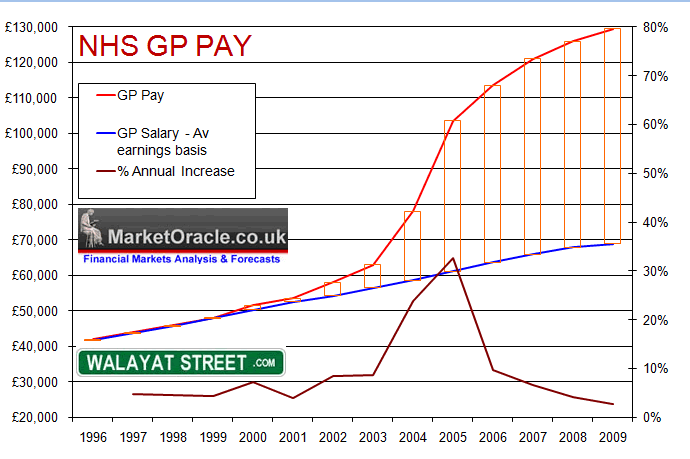
The Explosion in GP Pay contributed towards the MP Expenses scandal as when Labour came to power in 1997 average MP pay was £43,722 against average NHS GP pay of £44,000, so both were inline with one another at that time. However as the below graph illustrates in 2003 GP and MP pay started to see a serious divergence which ignited jealousy amongst MP's that directly led to the adoption of the policy of claiming expenses to the maximum so as to fill the ever widening gap between MP's and NHS GP's, as MP's could NOT get away with awarding themselves pay hikes of 30% per annum without voter out cry and risked losing their seats at the following general election, therefore across the board systematic abuse of expenses started to take place which basically meant real average MP pay was approx £98,000 per annum, still considerably less than where GP pay had risen to.
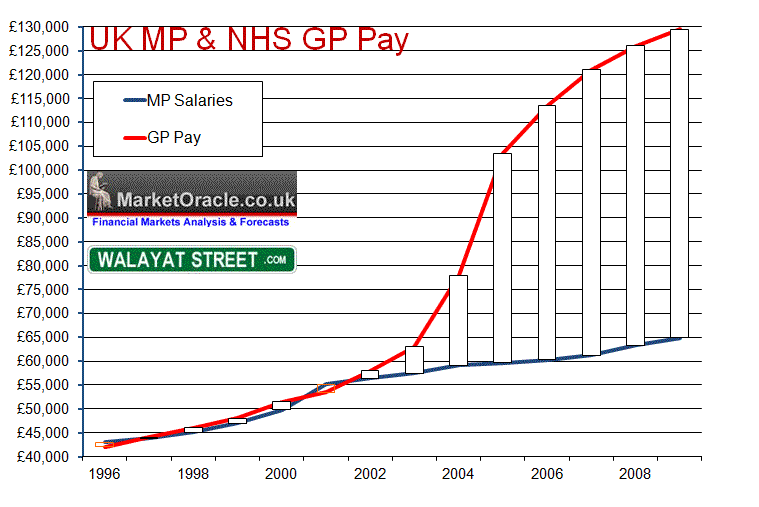
Therefore despite soaring spending on the NHS, productivity has actually been falling year in year out by an average of 1% per year, as illustrated by a Labour government commissioned report (McKinsey) during 2009 that called for a 10% cut in the NHS workforce, unfortunately the Labour government chose to bury the report ahead of the 2010 general election, which was only recently been published by the new coalition government.
The bottom line is that the NHS is a spending Black Hole that requires urgent and drastic reform so that tax payers receive value for money rather than effectively paying for TWO NHS's whilst only receiving delivery of one.
NHS Statistics Do Not Match Patient Experience
A lengthy report earlier this year into the REAL performance of one of Britain's top ranked hospitals placed The Mid Staffordshire NHS Foundation Trust as a killing field for patients that walked through its doors, this is set against official NHS statistics on hospitals and GP surgeries that relentlessly paint a picture of near uniform good performance, against the facts of actual patient experience as reported by the Telegraph.
Up to 1,200 patients are thought to have died unnecessarily at the trust between 2005 and 2008.
A damning report on the deaths found chronic staff shortages, receptionists in casualty departments assessing the urgency of cases and nurses switching off equipment that did not know how to use.
Both trusts are “Foundation Trusts” a status supposedly awarded to only the best in the NHS.
We were told by the Department of Health that Mid-staffordshire NHS Trust was a one off, an aberration, but barely a few days later further details leaked that it is barely the tip of the ice-berg with another 24 Hospitals with the similar problem of being engaged in the process of reducing their waiting lists by unnecessarily killing off patients, all according to the NHS produced official data are doing well as reported by the Daily Mail
Twenty five hospital trusts should be urgently investigated over fears that thousands of patients may have died unnecessarily, an expert said last night.
Excessive death rates at the trusts could be down to serious failings in the way patients were treated, according to Professor Sir Brian Jarman.
He said a total of 4,600 more patients had died at the 25 trusts than would be expected between 2007 and 2008
Remember these are are NHS trusts that are ranked by the NHS as the BEST hospitals in Britain ? Why ? because as with the rest of the NHS, self certification of OWN performance data results in propaganda rather than reality. Which means hospital's such as the Mid Staffordshire can get away with hiding 1,200 unnecessary deaths that are only revealed during public inquiries.
The Department of Health Funded GP Patient Survey
The same level of lack of performance applies to as many as 1/3rd of NHS GP surgeries that self certify themselves as being good, but actual patient experience does not match the official statistics, in this regard the Department of Health funded UK Patient GP Survey enables patients to find the truth about their GP Surgery as per real patient experience. The UK GP Patient Survey 2009-10 recently released results of more than 5.5 million detailed questionnaires sent out to NHS GP patients across England of which 2.17 million were returned. Patients can check the true performance of their surgeries here - http://results.gp-patient.co.uk/report/main.aspx
As an example of real performance of NHS GP Surgeries, the following are the Survey results for a local GP surgery - Darnall Community Health (Sheffield).
| % | |
| Overall Level of Satisfaction at the Quality of Healthcare received | 68% |
| Helpfulness of receptionist - Helpful total % | 75% |
| Ease of getting through on the phone - % Easy | 21% |
| Able to see a doctor fairly quickly | 41% |
| Doctor or nurse ever tell you that you had a 'care plan'? - % Yes | 14% |
| Ease of contacting the out-of-hours GP service by telephone - % Yes | 62% |
| Recommending GP surgery to someone who has moved to the local area - % Yes | 47% |
| Satisfaction with opening hours - Satisfied % | 62% |
| Last seen a doctor - % More than 6 months ago | 28% |
The results illustrate the disparity between official NHS statistics and actual patient experience, as virtually 1/3rd of the patients of the GP surgery are dissatisfied at the quality of healthcare received. Furthermore only 21% find it easy to get through on the phone, which explains why official statistics may be missing out on the 79% of patients who do not find it easy to get through on the phone to make an appointment, therefore many of whom won't be seen by the GP and hence will not factor into official statistics as generated by PCT's. Which also goes a long way towards explaining why only 28% of the surgeries patients have been seen by a GP during the past 6 months.
If Darnall Community Health is even half way typical of most NHS GP surgeries then that would imply that 10 million patients are dissatisfied at the quality of health care received, and as many as 30 million patients have difficulty in arranging appointments by phone, with similarly 30 million patients unable to see a doctor fairly quickly, and again 30 million would not recommend their NHS GP to anyone moving into the area, which does not quite match the propaganda that is usually pumped out by vested interests such as the 1.2 million that ride the NHS £120 billion+ gravy train.
Therefore not only does the NHS budget remain out of control, that the Coalition government has FAILED to seize the moment to get a real grip upon and cut, but actual patient experience does NOT match what amounts to NHS propaganda, the reality for many millions of patients is that the NHS effectively does not even exist.
As mentioned earlier, you can check the real patient experience of your GP surgery here - http://results.gp-patient.co.uk/report/main.aspx.
PCT's Scrapped and GP Consortia's
The new Coalition Government was apparently so impressed by the performance of the NHS Primary Care Trusts (PCT's) that as part of its cost cutting programme it intends to scrap ALL PCT's in favour of GP Consortia's directly managing patient treatment commissioning (the process could take 2-3 years to implement).
However, whilst the mainstream media has been focused on the news of scrapping of all NHS PCT's, the flip side of the coin lies in the consolidation of GP practices into GP consortiums in an attempt to introduce real competition between surgeries for patients which means that the less performing GP surgeries in cities such as Sheffield could (should) disappear as they will be unable to compete for patients in a more market orientated value for money environment due to their inability to provide health services to the satisfaction of a large % of their patients.
The anticipated changes are set against the current system which contrary to what the population believes GP's are Independant PRIVATE contractors to the NHS WITHOUT COMPETITION. GP's are basically a law onto themselves, and in the vast majority of cases totally unaccountable where complaining against GP's amounts to a total waste of time which is why the NHS is riddled with badly performing GP's as there is no real mechanism to get rid of those that are not up to the job, an issue which market forces would attempt to address.
Therefore under a more competitive GP health servicing market as consortia compete against one another for patients, those surgeries that rank at the bottom that prove unable in satisfying and thus retaining patients, should find themselves forced to merge and to restructure with new staff employed so as to ensure that the consortia's are better able to compete against one another for patients. This also means for the reforms to work then there must be at least 2 competing consortia in cities such as Sheffield, and preferably more other wise the reforms will FAIL and result in even worse patient health care experience as there will be NO incentive for GP's to treat patients but every incentive to deliver as much as possible of the £100 billion NHS budget into the back pockets of GP's which is probably what GP's expect to happen as occurred following the 2003 Labour GP contracts as illustrated earlier.
NHS Privatisation
The only answer to the crisis in the lack of productivity in the delivery of health care is for greater competition between surgeries and hospitals which ultimately means privatisation, as the existing system of no real competition means the lack of performance is rewarded with more resources in the face of inability to deliver whilst those that excel are punished with less resources so as to pull all services down towards the under performing mean.
The only way excellence can be rewarded and act is the goal to be achieved is if competition drives out of business the incompetent GP surgeries as they lose patients and resources to the better run GP surgeries which can only happen in a private system of healthcare delivery, where patients would in effect be handed NHS heath credit cards to enable them to buy healthcare at ANY health facility whether NHS run or private.
Given the actual performance of the NHS, I would imagine that closing 15% of the worst performing NHS Hospitals and GP Surgeries would result in IMPROVED life expectancy for Brit's as well as contribute £18 billion of annual savings to help bring the unsustainable £156 billion annual budget deficit under control rather than the policy of INCREASING the budget by more than £20 billion to placate the 1.2 million employed by the NHS.
The NHS Health Credit Card
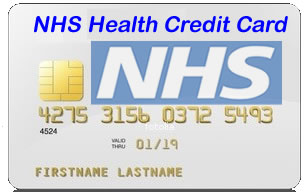 Reform of the whole NHS health care system from diagnosis to treatment of patients is urgently required. As mentioned above, an important element would be to place the power to purchase healthcare into the hands of the patients by means of an NHS Health Credit Card system, that enables patients to purchase health services from any GP practice or hospital regardless of whether it falls under the NHS umbrella or is fully private.
Reform of the whole NHS health care system from diagnosis to treatment of patients is urgently required. As mentioned above, an important element would be to place the power to purchase healthcare into the hands of the patients by means of an NHS Health Credit Card system, that enables patients to purchase health services from any GP practice or hospital regardless of whether it falls under the NHS umbrella or is fully private.
Patients would have a choice of covered core treatments for illnesses or injuries, where they would have the option of paying to top up treatments with their own money depending on the institution that they seek to purchase treatment from, or for other extra's including IVF etc. This would have the effect of reducing the cost of the NHS whilst introducing greater efficiency into the NHS as the majority of patients would only choose those health service institutions that are ranked as delivering a good service. The NHS Health credit card would revolutionise the way healthcare is delivered in the UK, much as supermarkets revolutionised food delivery and choice during the 1980's, as heath supermarkets would spring up all across the country that would maximise efficiency and standardise quality of service delivery as they competed to offer a wider range of health services than anything a bureaucratic top down health care system could ever hope to provide.
The health care credit card system could be further enhanced by workers directly contributing to their health care plans that they can claim upon to purchase 'extra' services at a later date, much as workers today contribute into private pension schemes.
The impact of this would be to greatly REDUCE the cost to taxpayers whilst at the same time delivering better health services, a win, win outcome for the people of Britain as opposed the current system of an out of control unproductive £120 billion National Health Service that attempts to mask failure to deliver with phony statistics and propaganda of a "free for all service" that does not match real patient experience.
Comments and Source : http://www.marketoracle.co.uk/Article23744.html
By Nadeem Walayat
Copyright © 2005-10 Marketoracle.co.uk (Market Oracle Ltd). All rights reserved.
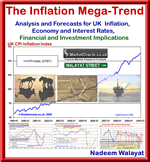 Nadeem Walayat has over 20 years experience of trading derivatives, portfolio management and analysing the financial markets, including one of few who both anticipated and Beat the 1987 Crash. Nadeem's forward looking analysis specialises on UK inflation, economy, interest rates and the housing market and he is the author of the NEW Inflation Mega-Trend ebook that can be downloaded for Free. Nadeem is the Editor of The Market Oracle, a FREE Daily Financial Markets Analysis & Forecasting online publication. We present in-depth analysis from over 600 experienced analysts on a range of views of the probable direction of the financial markets. Thus enabling our readers to arrive at an informed opinion on future market direction. http://www.marketoracle.co.uk
Nadeem Walayat has over 20 years experience of trading derivatives, portfolio management and analysing the financial markets, including one of few who both anticipated and Beat the 1987 Crash. Nadeem's forward looking analysis specialises on UK inflation, economy, interest rates and the housing market and he is the author of the NEW Inflation Mega-Trend ebook that can be downloaded for Free. Nadeem is the Editor of The Market Oracle, a FREE Daily Financial Markets Analysis & Forecasting online publication. We present in-depth analysis from over 600 experienced analysts on a range of views of the probable direction of the financial markets. Thus enabling our readers to arrive at an informed opinion on future market direction. http://www.marketoracle.co.uk
Disclaimer: The above is a matter of opinion provided for general information purposes only and is not intended as investment advice. Information and analysis above are derived from sources and utilising methods believed to be reliable, but we cannot accept responsibility for any trading losses you may incur as a result of this analysis. Individuals should consult with their personal financial advisors before engaging in any trading activities.
Nadeem Walayat Archive |
© 2005-2022 http://www.MarketOracle.co.uk - The Market Oracle is a FREE Daily Financial Markets Analysis & Forecasting online publication.



